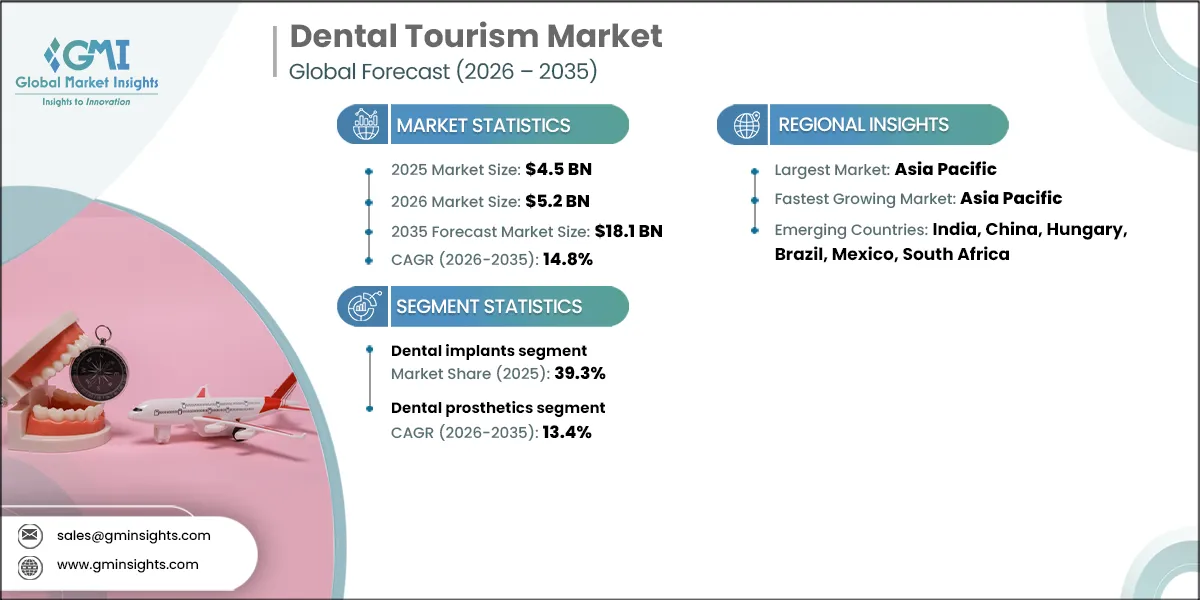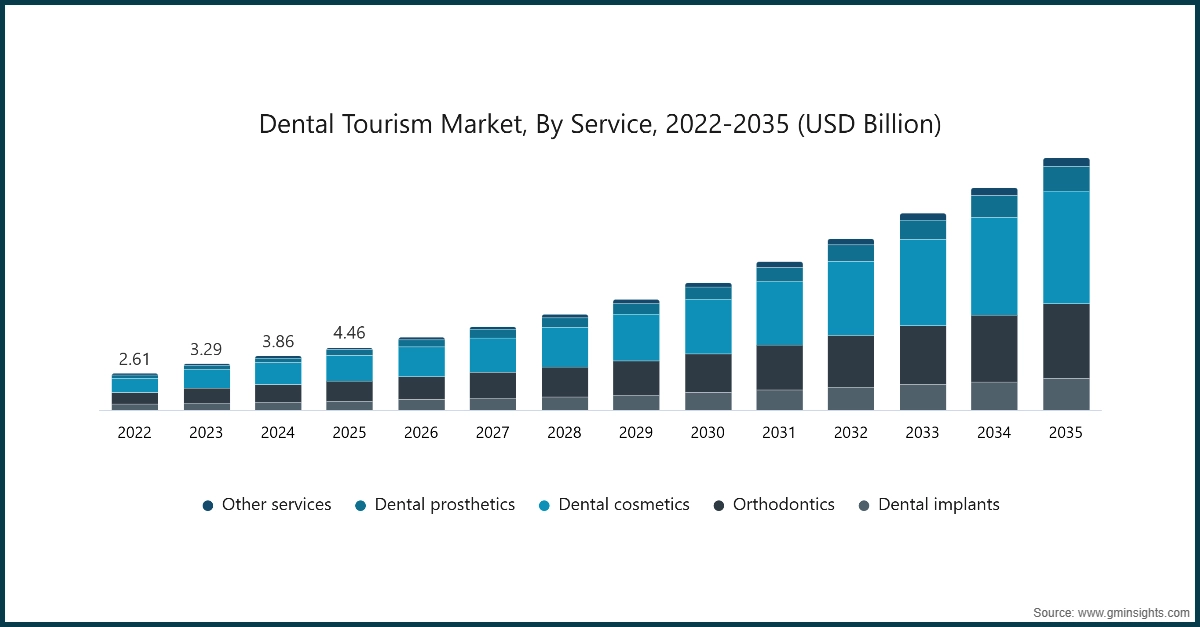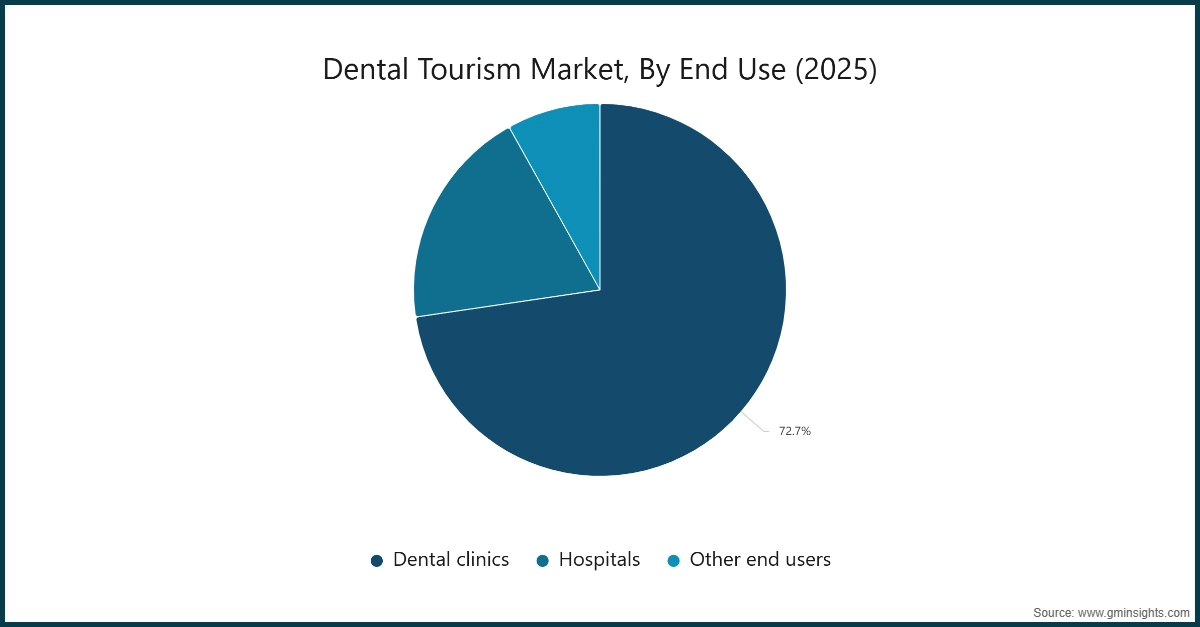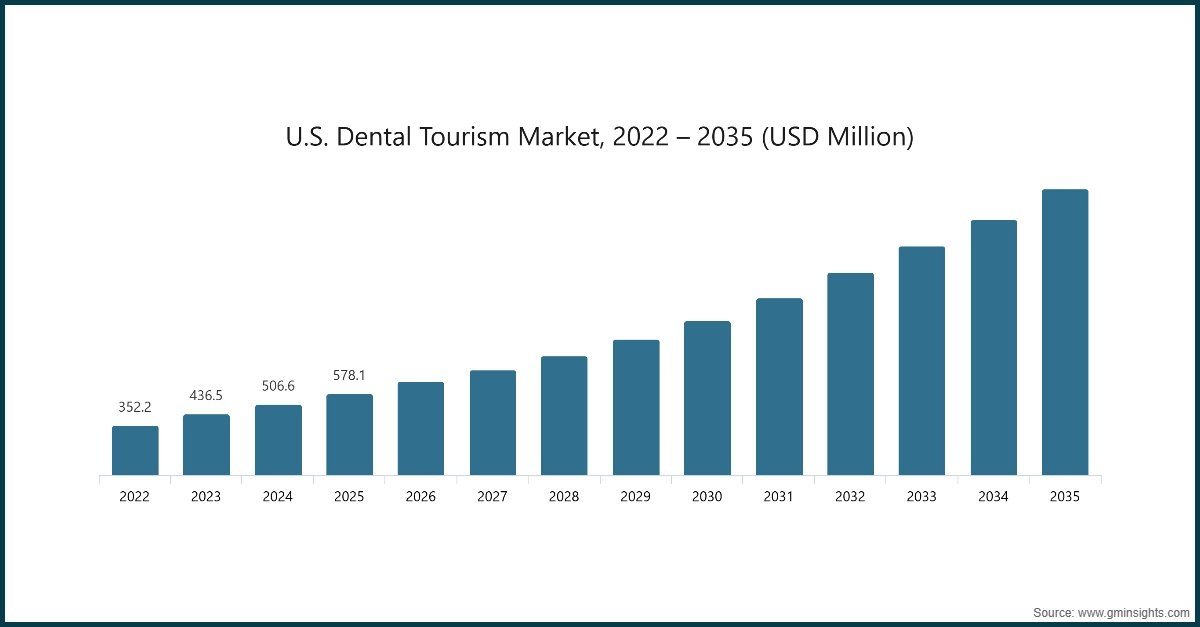Summary
Table of Content

Dental Tourism Market
Get a free sample of this report
Form submitted successfully!
Error submitting form. Please try again.
Thank you!
Your inquiry has been received. Our team will reach out to you with the required details via email. To ensure that you don't miss their response, kindly remember to check your spam folder as well!

Request Sectional Data
Thank you!
Your inquiry has been received. Our team will reach out to you with the required details via email. To ensure that you don't miss their response, kindly remember to check your spam folder as well!
Form submitted successfully!
Error submitting form. Please try again.
Dental Tourism Market Size
The global dental tourism market was valued at USD 4.5 billion in 2025. The market is expected to reach from USD 5.2 billion in 2026 to USD 18.1 billion in 2035, growing at a CAGR of 14.8% during the forecast period, according to the latest report published by Global Market Insights Inc. The high market growth is attributed to the rising dental care costs in developed markets, availability of high-quality dental care, and growth of cosmetic dentistry demand, among other contributing factors.

To get key market trends
Dental tourism is the practice of travelling across international or domestic borders for dental treatments with the goal of saving money, shortening wait times, or gaining access to advanced procedures. Cosmetic dentistry, implants, orthodontics, and restorative care are popular services that are often combined with travel and lodging arrangements.
The market has increased from USD 2.6 billion in 2022 and reached USD 3.9 billion in 2024, with a historic growth rate of 21.6%. Rising dental treatment costs in developed countries, the availability of low-cost quality care abroad, and increased acceptance of cross-border dental travel all contributed to market growth.
In addition, patients in the U.S., UK, and Western Europe frequently face high dental treatment costs, with many procedures falling outside traditional health insurance coverage. For instance, according to the American Dental Association (ADA), in 2022, approximately 46% of adults in the U.S. delayed or avoided dental care due to high costs.
Similarly, in the UK, the British Dental Association (BDA) reported in 2023 that over 30% of patients faced difficulties accessing affordable dental care under the National Health Service (NHS). These high out-of-pocket expenses drive many to seek more affordable dental solutions overseas, all while ensuring they don't sacrifice the quality of care.
Additionally, prolonged waiting times in public healthcare systems further incentivize this cross-border pursuit of dental services. For instance, NHS data from 2023 revealed that patients often waited over 6 months for non-urgent dental procedures, further pushing individuals to explore treatment options abroad.
Furthermore, expansion of international air routes, affordable flights, and visa-friendly policies support cross-border dental travel. Many countries have developed integrated medical tourism ecosystems, including patient coordinators, translators, accommodation, and post-treatment care. This reduces logistical barriers for international patients.
Dental Tourism Market Report Attributes
| Key Takeaway | Details |
|---|---|
| Market Size & Growth | |
| Base Year | 2025 |
| Market Size in 2025 | USD 4.5 Billion |
| Market Size in 2026 | USD 5.2 Billion |
| Forecast Period 2026-2035 CAGR | 14.8% |
| Market Size in 2035 | USD 18.1 Billion |
| Key Market Trends | |
| Drivers | Impact |
| Increasing prevalence of dental diseases | The rising incidence of dental caries, periodontal diseases, and tooth loss is increasing overall treatment demand, prompting patients to seek affordable and timely dental care through cross-border dental tourism. |
| Rising number of uninsured or underinsured patients | Limited dental insurance coverage in many developed countries is pushing patients to opt for overseas dental treatments that offer significant cost savings without compromising quality. |
| Advancements in dental treatment technologies | The adoption of digital dentistry, implants, and minimally invasive procedures in key dental tourism destinations is improving clinical outcomes and boosting patient confidence in traveling for care. |
| Growing awareness of dental tourism options | Greater access to online information, patient testimonials, and international clinic marketing is increasing acceptance and adoption of dental tourism globally. |
| Pitfalls & Challenges | Impact |
| High cost associated with dental tourism | Expenses related to travel, accommodation, and post-treatment stays can offset treatment savings, limiting adoption among price-sensitive patients. |
| Lack of standardized global dental care regulations | Variations in clinical standards, accreditation, and legal frameworks across countries continue to raise concerns about treatment quality and patient safety. |
| Opportunities: | Impact |
| Expansion of tele-dentistry and virtual consultations | Tele-dentistry will enable pre-treatment assessments and post-procedure follow-ups remotely, reducing uncertainty and encouraging more patients to opt for dental tourism in the future. |
| Growth in personalized and cosmetic dental treatments | Rising demand for customized cosmetic procedures such as smile design and aesthetic restorations will drive higher patient inflows to specialized international dental destinations. |
| Market Leaders (2025) | |
| Competitive Edge |
|
| Regional Insights | |
| Largest and fastest growing market | Asia Pacific |
| Emerging countries | India, China, Hungary, Brazil, Mexico, South Africa |
| Future outlook |
|
What are the growth opportunities in this market?
Dental Tourism Market Trends
The dental tourism industry is growing rapidly due to digital consultations, the integration of wellness and dental packages, and the emphasis on advanced and cosmetic procedures, among other factors driving industry growth.
Digital platforms for online consultations, treatment planning, and cost estimation are increasingly common in dental tourism. Patients can remotely evaluate clinics, connect with dentists, and receive a preliminary diagnosis. This tendency minimizes ambiguity and increases confidence in selecting offshore providers. It also expedites decision-making and enhances pre-trip planning. Destinations are offering dental treatments alongside wellness, spa, and leisure activities. Patients frequently combine procedures with vacation activities to create a comprehensive "dental + wellness" experience. This is particularly appealing to young and affluent travelers looking for a good deal and a fun vacation. Such packages set suppliers apart while also benefiting the wider travel industry. Furthermore, there is an increased demand for high-end elective procedures such as dental implants, veneers, smile makeovers, and full-mouth rehabilitations. Providers are investing in advanced technologies (CAD/CAM, 3D imaging) as well as specialized cosmetic expertise. This trend reflects growing aesthetic consciousness and a willingness to travel for superior results. It also broadens dental tourism beyond basic care, thereby supporting market growth.
Dental Tourism Market Analysis

Learn more about the key segments shaping this market
The global dental tourism industry was valued at USD 2.6 billion in 2022. The market size reached USD 3.9 billion in 2024, from USD 3.3 billion in 2023.
Based on service, the market is segmented into dental implants, orthodontics, dental cosmetics, dental prosthetics, and other services. The dental implants segment has asserted its dominance in the market by securing a significant market share of 39.3% in 2025 owing to the rising prevalence of tooth loss, increasing adoption of advanced implant technologies, high success rates, and growing demand for long-term restorative dental solutions among international patients. The segment is expected to exceed USD 8.1 billion by 2035, growing at a CAGR of 16.3% during the forecast period.
On the other hand, the dental prosthetics segment is expected to grow with a CAGR of 13.4%. The growth of this segment is driven by the increasing demand for crowns, bridges, and dentures, rising incidence of tooth loss among aging populations, and the availability of cost-effective, high-quality prosthetic solutions in dental tourism destinations.
The dental implants segment continues to lead the market. Dental implants are one of the most expensive dental procedures in developed countries due to their surgical complexity and material cost. Dental tourism destinations provide the same procedures at significantly lower costs, often including consultations, surgery, and prosthetics in bundled packages. This cost advantage is a major motivator for patients seeking implants abroad. The need for dental implants is being driven by the growing incidence of tooth loss brought on by ageing, periodontal disease, and lifestyle decisions. In developed nations, the elderly are especially at risk, but they also have financial difficulties at home. For single, multiple, and full-arch implant procedures, dental tourism is an affordable choice. The orthodontics segment held a revenue of USD 945.1 million in 2025, with projections indicating a steady expansion at 14.1% CAGR from 2026 to 2035. The rising demand for corrective treatments such as clear aligners and braces, combined with large treatment cost differences between home and destination countries, is encouraging patients to seek orthodontic care through dental tourism. The dental cosmetics segment accounted for significant revenue in 2025 and is anticipated to grow at a CAGR of 15.3% over the forecast period. The growing emphasis on aesthetic appearance and social confidence, combined with affordable access to advanced cosmetic procedures such as veneers and smile makeovers in international clinics, is propelling dental tourism for cosmetic treatments.

Learn more about the key segments shaping this market
Based on end use, the dental tourism market is classified into dental clinics, hospitals, and other end users. The dental clinics segment dominated the market with a revenue share of 72.6% in 2025 and is expected to reach USD 13.8 billion by 2035.
- An increasing number of patients from high-cost countries are looking for affordable dental care abroad. Dental clinics in popular tourist destinations benefit from this trend, as patients seek clinics that provide quality care at a lower cost. This leads to increased international patient volumes and revenue opportunities.
- Veneers, teeth whitening, and smile makeovers are particularly popular among international patients. Patients who want to improve their appearance are drawn to clinics that provide specialized cosmetic services. This trend encourages clinics to invest in cutting-edge technology and trained professionals.
- The hospitals segment accounted for significant revenue in 2025 and is anticipated to grow at a CAGR of 14% over the forecast period. Hospitals are driving dental tourism by providing comprehensive, multi-specialty care that meets internationally recognized standards, as well as advanced surgical facilities and bundled treatment packages that appeal to wealthy international patients.

Looking for region specific data?
North America Dental Tourism Market
North America held the significant revenue share of 14% in the global dental tourism industry in 2025.
- The U.S. market for dental tourism was valued at USD 352.2 million and USD 436.5 million in 2022 and 2023, respectively. The market size reached USD 578.1 million in 2025, growing from USD 506.6 million in 2024, and is anticipated to grow at a CAGR of 13.3% from 2026 to 2035.
- Dental care in the U.S. and Canada ranks among the most expensive in the world, particularly for implants, crowns, and full-mouth restorations. Even insured patients must pay high deductibles and copays. Patients are drawn to nearby destinations like Mexico and Costa Rica due to the high cost pressure. Price arbitrage remains the primary outbound driver.
- Most dental insurance plans in North America provide capped annual benefits and exclude advanced procedures. Treatments like implants and cosmetic dentistry are largely out-of-pocket expenses. This insurance gap pushes patients to seek affordable alternatives abroad. Dental tourism becomes a financially rational choice rather than a luxury.
Europe Dental Tourism Market
Europe market accounted for USD 1.4 billion in 2025 and is anticipated to show lucrative growth over the forecast period.
- Eastern Europe has emerged as a cluster for dental implants and prosthetics. Short flight durations and easy visa-free travel within the Schengen area support cross-border care. Patients can complete treatment with minimal travel disruption. Geographic accessibility strengthens regional tourism flows.
- Moreover, European patients are well-informed and actively compare treatment costs between countries. Clinics openly advertise standardized prices and certifications. This transparency reduces uncertainty and facilitates medical travel decisions. Informed patient behavior is a major market driver.
Asia Pacific Dental Tourism Market
The Asia Pacific holds the dominant position in the global dental tourism industry and is anticipated to grow at the highest CAGR of 15.9% during the analysis timeframe.
- Asia Pacific countries offer significantly lower dental treatment costs while maintaining acceptable quality standards. High patient volumes allow clinics to specialize and scale operations. This combination attracts patients from Australia, East Asia, and the Middle East. Cost efficiency drives inbound demand.
- Private dental clinics in the region are rapidly adopting digital dentistry and implant technologies. Investing in modern facilities increases international credibility. Many clinics are built specifically for foreign patients. Infrastructure development directly promotes tourism growth.
Latin America Dental Tourism Market
The Latin America market is experiencing robust growth over the analysis timeframe.
- Latin America’s closeness to the U.S. makes it ideal for short dental trips. Border cities and coastal destinations are easily accessible by road or short flights. Patients can return home quickly for follow-up care. Proximity significantly lowers travel-related anxiety.
- Clinics in the region are highly specialized in implants, crowns, and full-mouth rehabilitation. High procedural volumes lead to strong clinical experience. These complex treatments attract international patients seeking value. Specialization differentiates the region from competitors.
Middle East & Africa Dental Tourism Market
The Middle East & Africa (MEA) market is experiencing robust growth over the analysis timeframe.
- Countries such as the UAE and Turkey are positioning themselves as premium dental tourism hubs. Heavy investment in healthcare infrastructure supports international patient inflow. Dental clinics benefit from government-backed medical tourism strategies. Hub-based growth is a key regional driver.
- Further, the region has strong demand for aesthetic and cosmetic dental procedures. Clinics emphasize luxury care, advanced technology, and premium service delivery. This attracts affluent international patients. Cosmetic focus differentiates MEA from low-cost destinations.
Dental Tourism Market Share
The global dental tourism industry is moderately fragmented, comprising multi-specialty hospital groups, specialized dental clinic chains, and medical tourism facilitators operating across key destination regions such as Asia Pacific, Europe, Latin America, and the Middle East.
Leading players compete on treatment affordability, international accreditation, advanced dental technologies, and the ability to offer end-to-end patient services including travel assistance, accommodation, and post-treatment care.
Competition is increasingly shaped by service differentiation and geographic reach, with providers expanding international patient programs, investing in digital marketing, and adopting tele-dentistry for consultations and follow-ups.
Strategic partnerships with travel agencies, insurers, and hospitality providers, along with brand reputation and clinical expertise, are emerging as key factors influencing patient choice and long-term competitive positioning.
Dental Tourism Market Companies
Few of the prominent players operating in the dental tourism industry include:
- ACIBADEM Healthcare Group
- Apollo Hospitals
- Bumrungrad International Hospital
- Cancun Dental Specialists
- DentAkademi
- Fortis Healthcare
- Fulop Clinic
- KPJ Healthcare Berhad
- Kreativ Dental Clinic
- Manipal Hospitals
- Max Healthcare
- Mount Elizabeth Medical Centre
- Raffles Medical Group
- Thonglor Dental Hospital (TDH)
- Vera Smile
Its internationally accredited hospital network combined with advanced clinical infrastructure and dedicated international patient centers. Its strong focus on personalized care, multilingual support, and seamless treatment coordination enhances its appeal among global dental tourists.
Raffles Medical Group’s USP is its integrated, multi-specialty healthcare model supported by a trusted brand and wide regional presence across Asia. Consistent clinical standards, continuity of care, and comprehensive patient management make it a preferred choice for international dental patients.
Dental Tourism Industry News:
- In August 2025, Ac badem Healthcare Group acquired an 80% stake in Bay-nd-r Healthcare Group for USD 55 million, which increased its total number of hospitals in Turkey. This acquisition strengthened Ac badem’s hospital network and expanded its clinical capacity across key metropolitan locations. The deal enhanced service availability, improved patient intake for international medical tourists, and supported higher procedural volumes through expanded infrastructure.
- In June 2024, Vera Smile announced the launch of its cutting-edge dental implant services, reinforcing its commitment to improving oral health and delivering advanced smile restoration solutions. The introduction positioned the clinic as a technologically advanced provider capable of setting higher standards in implant dentistry. This development supported growth in the market by strengthening international patient confidence, enhancing treatment differentiation, and increasing Turkey’s attractiveness as a premium destination for advanced dental care.
The dental tourism market research report includes an in-depth coverage of the industry with estimates and forecast in terms of revenue in USD Million from 2022 – 2035 for the following segments:
Market, By Service
- Dental implants
- Orthodontics
- Dental cosmetics
- Dental prosthetics
- Other services
Market, By End Use
- Dental clinics
- Hospitals
- Other end users
The above information is provided for the following regions and countries:
- North America
- U.S.
- Canada
- Europe
- Germany
- UK
- France
- Spain
- Belgium
- Poland
- Hungary
- Czech Republic
- Turkey
- Asia Pacific
- China
- Japan
- India
- Australia
- South Korea
- Latin America
- Brazil
- Mexico
- Argentina
- Middle East and Africa
- South Africa
- Saudi Arabia
- UAE
Frequently Asked Question(FAQ) :
What is the projected value of the dental tourism market by 2035?
The dental tourism market is expected to reach USD 18.1 billion by 2035, propelled by digital consultations, expansion of tele-dentistry, and growing demand for personalized and cosmetic dental treatments.
What is the current dental tourism market size in 2026?
The market size is projected to reach USD 5.2 billion in 2026.
How much revenue did the dental implants segment generate in 2025?
The dental implants segment held a market share of 39.3% in 2025 and is expected to exceed USD 8.1 billion by 2035, driven by rising prevalence of tooth loss and high success rates.
What was the market share of the dental clinics segment in 2025?
The dental clinics segment dominated the market with a revenue share of 72.6% in 2025 and is expected to reach USD 13.8 billion by 2035.
What is the growth outlook for the Asia Pacific dental tourism from 2026 to 2035?
Asia Pacific market is projected to grow at the highest CAGR of 15.9% till 2035, driven by significantly lower dental treatment costs, rapid adoption of digital dentistry and implant technologies, and high patient volumes allowing clinic specialization.
Who are the key players in the dental tourism market?
Key players include ACIBADEM Healthcare Group, Apollo Hospitals, Bumrungrad International Hospital, Cancun Dental Specialists, DentAkademi, Fortis Healthcare, Fulop Clinic, KPJ Healthcare Berhad, Kreativ Dental Clinic, Manipal Hospitals, Max Healthcare, Mount Elizabeth Medical Centre, Raffles Medical Group, Thonglor Dental Hospital, and Vera Smile.
What are the upcoming trends in the dental tourism market?
Key trends include increasing use of digital platforms for online consultations and treatment planning, integration of dental treatments with wellness and spa packages, and growing demand for high-end elective procedures such as dental implants, veneers, and smile makeovers using advanced technologies like CAD/CAM and 3D imaging.
Which region leads the dental tourism market?
The U.S. market was valued at USD 578.1 million in 2025 and is anticipated to grow at a CAGR of 13.3% from 2026 to 2035.
What is the market size of the dental tourism in 2025?
The market size was USD 4.5 billion in 2025, with a CAGR of 14.8% expected through 2035 driven by rising dental care costs in developed markets, availability of high-quality dental care abroad, and growth of cosmetic dentistry demand.
Dental Tourism Market Scope
Related Reports


